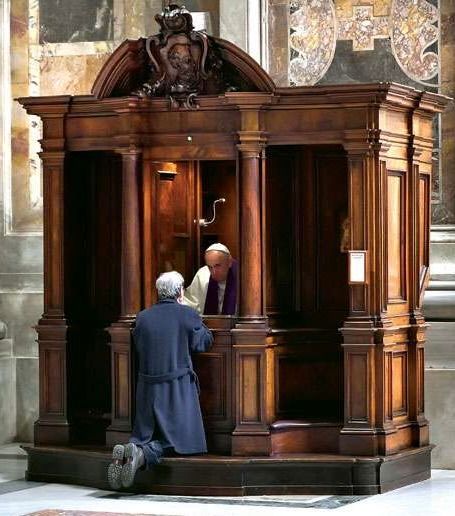New Paragraph
Penance / Confession
If you forgive the sins of any, they are forgiven them; if you retain the sins of any, they are retained. (John 20:23)
Confessions at St. Vincent's
Sunday
30 minutes before all the Masses
Weekdays
11:30 am - 12:00 pm
Saturday
10:00 am - 11:00 am
You may also schedule an individual confession with a priest
by calling (213) 749-8950
What Happens in Sacrament of Penance?
In the Sacrament of Penance, a person filled with sorrow comes into the presence of Christ in the person of the priest to their confess sins. The priest in complete confidentiality listens and offers words of advice and consolation, imposes a penance, and absolves the sinner by Christ's authority. It is Christ in the person of the priest who hears the confession of guilt and absolves. The “seal of confession” requires that the priest must not under any circumstances reveal the confessed sins of a particular penitent.
The priest announces Christ’s mercy when he says, “I absolve you from your sins in the name of the Father and of the Son and of the Holy Spirit." This prayer of absolution forgives sin but does not fully heal the wounds caused by sin. The priest thus imposes a penance, which may take the form of prayers, almsgiving, charitable acts, small sacrificial acts, or the patient bearing of life's crosses.

Brief Examination of Conscience
- Do I pray to God every day? Have I thanked God for his gifts to me?
- Did I put my faith in danger through readings contrary to Catholic teachings or involvement in non-Catholic sects? Did I engage in superstitious practices: palm reading or fortune-telling?
- Did I take the name of God in vain? Did I curse or take a false oath?
- Have I judged others and ranked myself above them? Have I been arrogant and refused to admit that I was wrong?
- Have I envied or been jealous of the abilities, talents, ideas, good looks, intelligence, clothes, possessions, friends, money, or family of another?
- Did I miss Mass on Sundays or holy days of obligation through my own fault? Am I attentive at Mass? Did I keep fast and abstinence on the prescribed days?
- Did I disobey my parents and lawful superiors in important matters?
- Did I hate or quarrel with anyone, or desire revenge? Did I refuse to forgive? Was I disrespectful?
- Have I been impatient people, events, family, suffering or sickness?
- Did I get drunk? Did I take illicit drugs?
- Did I consent to, recommend, advise, or actively take part in an abortion?
- Did I willfully look at pornography, entertain impure thoughts, or engage in impure conversations or actions? Did I use artificial means to prevent conception?
- Was I unfaithful to my spouse? Did I engage in sexual activity outside of marriage?
- Did I steal or damage another’s property? Have I been honest and just in my business relations?
- Have I been responsive to the needs of the poor and respected the dignity of others?
- Did I tell lies? Did I sin by gossip, calumny, or detraction, of others? Did I judge others rashly in serious matters?
Recite the Act of Contrition
Oh my God, I am heartily sorry for having offended you, and I detest all my sins because I dread the loss of heaven and the pains of hell; but most of all because they offend you, my God, who are all good and deserving of all my love. I firmly resolve with the help of your grace to confess my sins, do penance, and to amend my life. Amen.
Why Do I need to Confession My Sins to a Priest?
You might say, “I have a personal relationship with Jesus. I can talk to God directly”. Or “Jesus is the only mediator between God and man”.
While both above statements may be true, they do not give us the whole truth. Going to confession is simply doing what Jesus told us to do.
Catholics do not confess their sins to a priest as a man. When a Catholic confesses his sins in the presence of a priest, it is Christ that he is talking to through the priest, and Christ who is offering forgiveness. In the Gospels, Jesus emphasizes again and again that the Church must offer this sacrament to people:
- In Matthew 16:18-19, Jesus gives the power to forgive sins to Peter and to his successors. “And so I say to you,” says Christ, “…you are Peter, and upon this rock I will build my Church, and the gates of the netherworld shall not prevail against it. I will give you the keys to the kingdom of heaven. Whatever you bind on earth shall be bound in heaven; and whatever you loose on earth shall be loosed in heaven.”
- Again in Matthew 18:18, the Savior says: “Truly I say to you, whatever you bind on earth shall have been bound in heaven; and whatever you loose on earth shall have been loosed in heaven.”
Christ gave the power to forgive sins to the Apostles, who in turn passed it along to their successors, the bishops and priests (cf. National Catholic Register, March 19, 2017).
What Sins Must I Confess?
All grave sins not yet confessed, which a careful examination of conscience brings to mind, must be brought to the sacrament of Penance. The confession of serious sins is the only ordinary way to obtain forgiveness.



